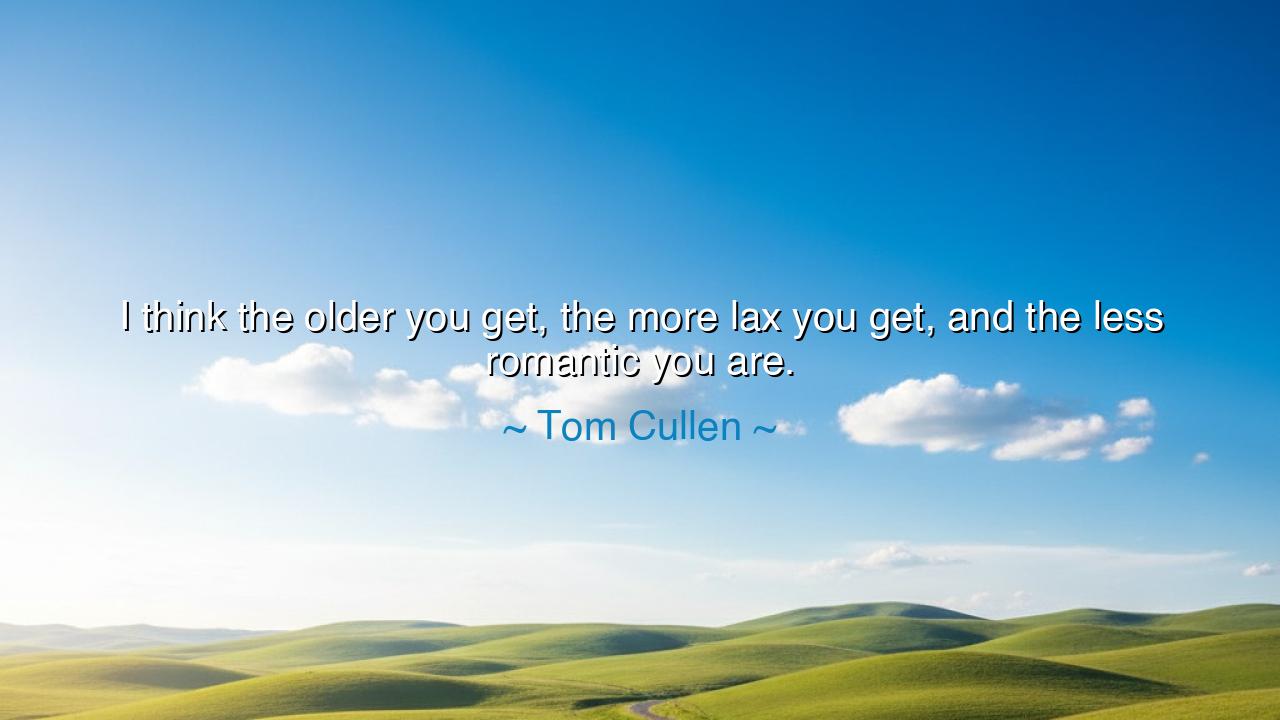
I think the older you get, the more lax you get, and the less






In the quiet reflection of time, Tom Cullen offers a truth that many of us may hesitate to admit: "I think the older you get, the more lax you get, and the less romantic you are." This statement carries the weight of experience, for it speaks not merely of age, but of the natural progression of the human spirit. When we are young, we are filled with the frenzy of romantic ideals, with dreams of grand gestures and passionate adventures, as if each day is a new story waiting to be written. Yet, with the passage of years, the romanticism of youth gives way to the practicalities of life, and the dreams that once seemed so vibrant often fade into the background.
To understand this sentiment, we must first look to the wisdom of the ancients. The Greeks, who revered the complexities of human nature, often spoke of the seasons of life. In their philosophy, youth was the season of zeal and fervor, a time when the spirit was bold and the heart unburdened by the weight of responsibility. In contrast, the later years were a time of wisdom and acceptance, a period where the fire of passion often gave way to the steady glow of experience. Plato, in his dialogues, spoke of the idealism of youth as something both beautiful and fleeting, while Aristotle cautioned that the pursuit of virtue in older age should move beyond the passion of youth to the reason of maturity. Thus, in Cullen’s words, we see the ancient truth that with age comes a shift—a transition from the idealistic to the realistic, from romance to pragmatism.
The Romans, too, understood this transformation. In the tales of their greatest warriors and statesmen, we see men and women who, in the bloom of youth, were driven by intense emotions and visions of glory, only to later embrace the duties and realities of life. Consider Cicero, whose early orations were filled with the fiery passion of a young man eager to change the world, but whose later works reflected the patience and sobriety of a seasoned statesman. Similarly, the great Julius Caesar, whose early career was marked by bold, romantic gestures and military campaigns, found his later years consumed by the complexities of empire and governance. This transition from the romantic to the practical is not a decline, but a shift—an evolution of character, shaped by the demands of life.
In the modern world, this concept is no less true. Ralph Waldo Emerson, in his writings, explored the contrast between youthful idealism and the more measured approach of later years. He believed that romanticism, in its most intense form, could only exist in the realm of dreams, but that the truly wise man or woman was one who learned to integrate their passions with reason and understanding. To lose one’s sense of romance in the latter years is not a failure; rather, it is the natural outcome of having seen and experienced the world in its full complexity. The romantic ideals of youth often fade not because we no longer believe in love or adventure, but because we learn to see the world through the lens of experience, where the frenzied dreams of youth must be tempered by the practical realities of life.
Yet, Cullen’s words do not speak solely of the loss of romance but also of the freedom that comes with age. For as we grow older, we often shed the weight of expectations—whether societal, familial, or self-imposed—that once burdened us. In youth, we may long for perfection, but in later years, we learn to accept imperfections with grace. Romance in youth is often tied to an idealized vision of love and life, a vision that may not withstand the tests of time. In older age, however, we may find romance not in grand gestures, but in the quiet moments of connection and understanding. There is romance in the steady hand of a partner, in the shared silence between two people who have journeyed together through the years.
The lesson in Cullen’s reflection is clear: romance in its most passionate form is often the province of the young, but as we grow, we learn to find meaning and beauty in more subtle and enduring forms. Romance does not die with age; it evolves. The lesson we must take from this is not one of regret for the loss of youthful ideals, but one of acceptance and appreciation for the changes that come with time. We must embrace the wisdom that comes with age, understanding that the loss of idealism often opens the door to deeper, more realistic connections, where love is not defined by the flash of passion, but by the quiet constancy of shared experience.
As you walk through the stages of your own life, remember that with age comes the opportunity to shed the idealistic and embrace the authentic. Do not mourn the fading of youthful romance, but celebrate the new forms of connection that age brings. Seek the quiet, steady moments of love and companionship that stand the test of time, and in doing so, you will find that the romantic spirit is never truly lost. It is simply transformed, shaped by the experiences of life into something deeper and more enduring.






AAdministratorAdministrator
Welcome, honored guests. Please leave a comment, we will respond soon